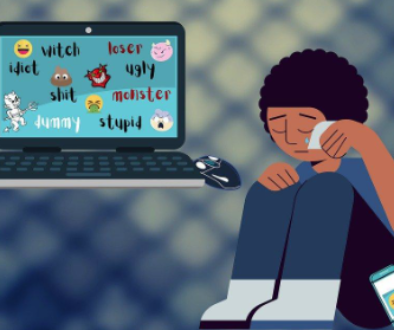The Psychology of Cyberbullying

Traditionally, school bullying was restricted to the school premises, playgrounds, or classrooms. A bully was typically characterized by a large physical body or by an intimidating voice tone.
This is no longer the case. Over the last few decades, our lives are now entrenched with digital devices like mobile phones and round-the-clock Internet access. Hence, cyberbullies now have access to potential victims over social media platforms, online games – or even through personal mediums like online chats, emails, or direct messaging.
What is the psychology behind cyberbullying – and why do cyberbullies behave in this manner? Let’s discuss the mental aspects of cyberbullying in this article.
When does cyberbullying occur?
Cyberbullying occurs only when each of the following 5 criteria is met:
- Intention
This is the first of the five criteria where cyberbullies must have the intent to psychologically harm their targets. However, cyberbullying can still occur without any intention – only if the victim perceives the bully’s actions to be harmful to them.
- Repetition
Cyberbullies thrive in repeating their intended actions toward their victims. As compared to traditional bullying, cyberbullying actions remain present on the Internet for a longer time. For example, sharing false information or personal photos of the victim on social media platforms.
- Imbalance of power
Just like traditional bullying, there is a clear imbalance of power in cyberbullying. Cyberbullies also enjoy a higher position of power over their victims. This is particularly true when cyberbullying occurs on social media platforms or any public forum.
- Anonymity
In some instances, cyberbullies can hide their true identity and use anonymity to abuse the intended victim. Cyberbullies find it much easier to be anonymous on any online platform. In this scenario, there need not be any imbalance of power between the cyberbully and the victim.
- Publicity
Publicity is a criterion opposite to that of anonymity. In this case, cyberbullies can choose to openly abuse or humiliate their victims in public.
Next, let us understand the psychology of a cyberbully and why they choose to bully.
Why does a person indulge in cyberbullying?
Most adults admit to indulging in bullying at some point in their lives. Cyberbullies do not have any personality traits that are different from the rest. However, cyberbullies display an extreme level of personality traits like an obsession, jealousy, and lack of empathy.
Why does any person cyberbully? This abusive technique enables them to project their feeling of self-distress on another person. For instance, cyberbullies can relieve themselves from distress or frustration by sending abusive messages to their victims. By using anonymity, cyberbullies try to protect themselves from any possible backlash to their actions.
Cyberbullies also feel “secure” when they are part of a bigger group of people hurling online abuses on the target user. This also acts as another form of anonymity.
When does any person become a cyberbully? Here are some of the enabling factors:
- Mental health problems
Most cyberbullies have a host of mental health problems such as aggression, hyperactivity, and narcissism. For these individuals, cyberbullying is a form of expressing their lack of empathy for others – or to get a sense of higher power.
- Victims of cyberbullying
Certain individuals become cyberbullies after being cyberbullied themselves. In this case, cyberbullying becomes their way of expressing resentment towards their perpetrator – or a way to “lash out” in response to their negative experience.
- Loneliness
Most cyberbullies suffer from a life of loneliness or isolation from the general society. They are not part of any social circles and feel ignored by their peers.
- Conflicts or breakups
On the other side of loneliness, individuals become cyberbullies after a major breakup (with friends or relationship partners). An ongoing conflict between friends can also lead to one of them turning into a cyberbully. In this case, cyberbullying is a way of expressing their hurt or frustration – and taking revenge.
- Lack of positive connections
Cyberbullies are unable to establish healthy or positive connections with other people. Instead of being isolated, they choose to have negative communications (through online abuse) that look more rewarding and satisfying.
Next, let’s understand why individuals (impacted by the above factors) choose to become cyberbullies as compared to traditional bullying.
Why do individuals choose to cyberbully over traditional bullying?
With the explosion of mobile devices and online platforms, cyberbullies can indulge in various types of online bullying that were limited to traditional bullying. Here are some reasons why they indulge in cyberbullying:
- They can target high-profile people or celebrities.
Cyberbullying is not necessarily restricted to children or young adults. It can also be directed at high-profile people or celebrities. For instance, flaming is a type of cyberbullying where inflammatory language or offensive messages are directed towards a popular person (with the hope of inciting a response).
- There is no limit to cyberbullying.
Traditional bullying was restricted to a selected period or place. This is not the case with cyberbullying. They can target an individual with online abuse at any time or no matter where they are geographically located. They can also target other individuals across multiple platforms including social media accounts, posted comments, and through email addresses.
- Cyberbullying victims are unable to escape.
Victims of cyberbullying can choose to disconnect themselves from the online world following an incident. However, younger adults continue to be addicted to their mobile phones and apps. This allows them to have positive interactions with their friends or peers. On the flip side, this means there is no respite from the “negative” messages and thus, no escape from the ordeal.
Conclusion
As human beings, we are essentially social creatures. With the advent of the mobile phone, more individuals are “emotionally” attached to the device – and seek ways to use the digital medium for satisfying our primitive needs. Cyberbullying is a “negative” form of fulfilling the emotional needs of people.



